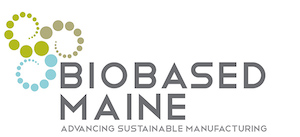Bioplastics Cluster Looks to Maine Potatoes
MAINE TECHNOLOGY INSTITUTE | MTI grants received: Cluster Enhancement Awards. In 2008 the MTI board of directors approved a Cluster Enhancement Award of $200,000, matched by $459,000, to support a sustainable bioplastics cluster project to make PLA, a biodegradable plastic from Maine potatoes. Over the next 18 months, the cluster members worked together to demonstrate the feasibility and marketability of producing an environmentally friendly organic plastic from one of the state’s traditional crops. The collaborating organizations have evaluated establishing a trade association to exchange information, influence related policies, educate consumers and other companies, and build market awareness for Maine made potato-plastic products.
The effort is administered by Maine Initiatives, Inc., and led by the Environmental Health Strategy Center and True Textiles, Inc. (formerly known as InterfaceFABRIC), the primary working group coordinating the activity. Researchers at the University of Maine in Orono are exploring the technical aspects of using potato starch to create the base product, polylactic acid, known as PLA, a biodegradable plastic resin. Meanwhile, staff at UMaine’s Margaret Chase Smith Policy Center are researching the market, while potato growers and processors are working with the Maine Potato Board and other project participants to identify possible locations for a factory, more than likely in Aroostook County.
According to the Environmental Health Strategy Center, an earlier report from the Margaret Chase Smith Policy Center indicated that it is economically feasible for Maine potato growers to plant and harvest potatoes specifically for the manufacture of PLA, using potato varieties that are currently grown. “One interesting finding from our research is that for the initial plant we don’t need to take potatoes away from use as food to meet the needs for bio-plastic production,” explained report co-author Kate Dickerson. “The amount of PLA needed by True Textiles could likely be supplied by waste potatoes that are below food grade.”
This project presents an opportunity to coordinate research that some of the partners had already conducted separately. A number of organizations in the industrial, medical, personal care, agricultural and consumer products sectors have either developed or are in the process of developing products from PLA. True Textiles manufactures a PLA-based fabric, Terratex, for commercial interiors. “We are extremely excited about the potential for a Maine-made bioplastic,” stated Stacie Beyer, Corporate Environmental Manager. “This project would join two of Maine’s traditional industries, agriculture and textile manufacturing, in a unique new way, making fabric in Maine from Maine potatoes.” Poland Spring and Tom’s of Maine would like to convert their bottles and packaging to biodegradable PLA plastics. Sagoma Technologies designs and manufactures molded plastic products and would like to gain knowledge about PLA processing and increase its use by customers. The only PLA producer currently in operation in the United States is located in Minnesota and uses corn as its feedstock; it reportedly can meet only half its demand. Other concerns associated with the use of corn-based PLAinclude competition for the corn resource in general and the use of this genetically modified (GMO) feedstock. For Tom’s of Maine, the need for a GMO-free bioplastic is an important aspect of their participation in the project.
Already well developed, the process for creating the PLA monomer is based on fermenting sugar from any form of starch to create lactic acid. Applied research is needed to establish proof of concept for the process from potato feedstock to PLA. In particular, the University of Maine will be looking closely at the impacts of potassium from potato feedstock on the quality of the lactic acid. Also, it has yet to be determined how potato PLA will behave in the varied manufacturing processes of the group, including carding, spinning and weaving of fabrics, extrusion and casting of foams and non-wovens, and thermoformed and molded plastics. As the project has progressed, the team has begun considering the use of woody biomass as a second source. Collaboration on linking the PLA raw material development with the various plastic applications is a particularly important aspect of the project. The research will also take into account the environmental footprint and the costs of production and transportation, particularly in relation to the current primary PLA source, industrial corn. If Maine produced potato-based or wood-based sustainable bioplastics prove to be environmentally superior, then Maine-made PLA might command a premium price in the marketplace, which is increasingly influenced by petroleum costs. Project success would lead to bolstering agriculture and preserving manufacturing jobs, while also decreasing petrochemical dependence.
The MTI Cluster Enhancement Award is helping members of the sustainable bioplastics cluster work together to develop and share knowledge and innovation, as well as overcome barriers quickly, through collaboration on standards, methods and applications that collectively could lead to new and improved Maine products. By working together, they aim to demonstrate the feasibility of potato or wood PLA technology, lead the industry, grow businesses and create jobs, while having a positive effect on the environment—not just in Maine, but across the country.
Maine Initiatives, Inc.
295 Water Street, Suite 100
P.O. Box 2248
Augusta, ME 04338
Phone: 207-622-6294
Fax: 622-6295
info@maineinitiatives.org
Collaborating organizations: The Environmental Health Strategy Center, True Textiles Inc., Rynel, Inc., Biovation, Tom’s of Maine, Grow Tech Inc., The Margaret Chase Smith Policy Center, UMaine’s Process Development Center, the Maine Potato Board, Maine Organic Farmers and Gardeners Association, and Green Harvest Technology, LLC
